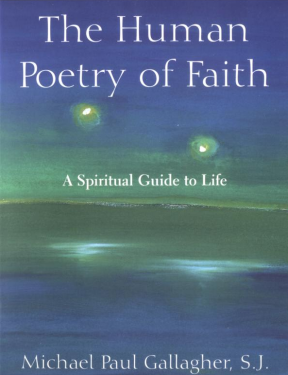This is the third column in a series
 AS I MENTIONED in the first two columns of this series, “The Human Poetry of Faith: A Spiritual Guide to Life” (New York: Paulist Press, 2001, pp. 142, $12.95) by Father Michael Paul Gallagher, S.J., is directed toward those who seem to be uninterested in religion, who might even declare that God and religion are not on their radar.
AS I MENTIONED in the first two columns of this series, “The Human Poetry of Faith: A Spiritual Guide to Life” (New York: Paulist Press, 2001, pp. 142, $12.95) by Father Michael Paul Gallagher, S.J., is directed toward those who seem to be uninterested in religion, who might even declare that God and religion are not on their radar.
Father Gallagher tries to help readers reflect more deeply on their experiences, on questions that should be important to everyone.
Early in the book, Father Gallagher reports that he has stopped counting the number of times he’s heard young people report on their “cultural desolation.” He writes that he has heard variations on this theme and he offers an example of what he has heard. The young person confesses that in society it is impossible to be oneself, that everything is appearance. It is difficult to find others who are also unhappy with the trivial games that people play. Anything serious is laughed at and to be interested in religion is “weird.” There has to be some way of living that is better than the superficial way of living that seems so pervasive. Persons who feel this way are the persons for whom Father Gallagher wrote his book.
Though I do not have the experience of hearing many young people describe their lives in the way that Father Gallagher reports, my suspicion is that if I was able to question them and they were honest in their responses then they might say something similar. Father Gallagher believes, as do many contemporary Catholic theologians, that we often need to get in touch with ourselves before we can be ready to accept the Good News of Christ.
Creating Personal Space
To anyone who feels “cultural desolation,” Father Gallagher offers this advice:
“To such a person I would say: ‘If God or religion seems in a fog for you, try another route towards the threshold of faith. You need time to listen to your own human depths, with imagination and quiet. Yes, the superficial culture can block what your heart desires. A choice is required to resist the pressures and find space. If you create a more personal space, what major concerns will surface for you? Relationships and the path of love. Some sense of self-disappointment and guilt. A feeling of impotence because of the tragedies of our divided planet. A longing for stillness where some spiritual awareness could be nourished. A search for anchors within the scattered life of everyday.” (p. 9)
Though neither God nor religion seems a “fog” to me, I believe that I have profited from Father Gallagher’s advice. When I have been quiet and tried to listen to what the Jesuit priest calls my own “human depths,” I think I have profited from the experience. I suspect that many of us live at a hectic pace. I know I do and I also know that I must make time to allow myself to be still and calmly focus on what I think is important in my life. When I do this, I believe that God “speaks” to me. I believe that God is at the depth of my being.
Whenever I am tempted to be discouraged at the phenomenon of people not attending Mass or leaving the Church or showing little interest in what I consider the most important truths about us and God, I remind myself that God cares more about such people than I do. I also remind myself that all persons are oriented toward God and that awareness of God’s presence and love can happen at any moment. Father Gallagher writes the following:
“We have a natural desire for God. Which means that our hearts are always on the watch-out for vision, love, fullness, surprise – if only we can emerge from the prisons of our smaller concerns. There is a readiness for the real God within us, not fulfilled by the god of complacent religion. … Within ordinary human experience are untapped sources of wonder. Within easy reach of anyone is a different way of seeing things. I have been amazed to find how relatively effortless it is to open doors of new imagination for people. It is as if many of us are simply waiting for someone to come along with a key or a mirror – in order to open a door, or to see one’s depth. Jesus delighted in offering people freedom from their many prisons.” (p. 11)
I am encouraged by Father Gallagher’s words. We are surrounded by the Holy Spirit, by Infinite Love. I shouldn’t be surprised that there are moments when we respond.
Father Robert Lauder, philosophy professor at St. John’s University, Jamaica, is the author of “Pope Francis’ Spirituality and Our Story” (Resurrection Press).
